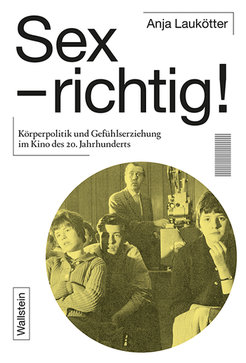Sex - right!
Body Politics and Emotional Education in 20th Century Cinema.
Habilitation by Anja Laukötter from the Research Center for the History of Emotions.

Anja Laukötter: Sex - richtig! Körperpolitik und Gefühlserziehung im Kino des 20. Jahrhunderts, Göttingen: Wallstein 2021.
Sex education films attempted to shape people's attitudes and behavior throughout the 20th century. They circulated around Europe, traveled to the United States, and back. Their visual and epistemological frame of reference were the fields of medicine, education, and psychology, something that was reflected in audience research as well. Emotions were constantly evoked in the name of bodily health, but the emotional culture around them changed. In World War I, knowledge about syphilis was supposed to induce fear and thus discourage soldiers from unprotected sexual contact. In Weimar cinema, the population was mobilized against "false shame." At the battlefield cinemas under National Socialism, fear was replaced by feelings of unconditional trust.
During the occupation, films demanded understanding, especially for the younger generation. This then had to be nurtured through "positive emotions" into a "socialist personality" in the GDR, or into self-management in West Germany. The fight against AIDS fueled the merging of emotions and forms of knowledge transmission. The history of sex education films therefore tells us not only about how a global media culture took shape, but also how it was controlled.
Anja Laukötter's habilitation was awarded the Otto-Hintze-Prize by the Claudia-and-Michael-Borgolte-Foundation and has now been published as a book.
The author is a Senior Researcher at the Research Center for the History of Emotions at the Max Planck Institute for Human Development and co-leader of the international ERC research group "The healthy self as body capital" (Advanced Grant).
